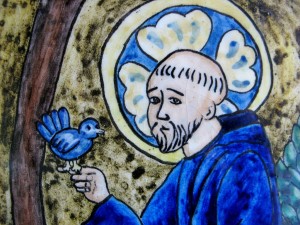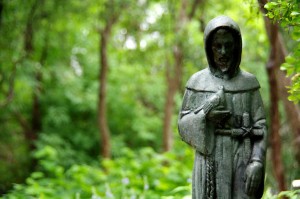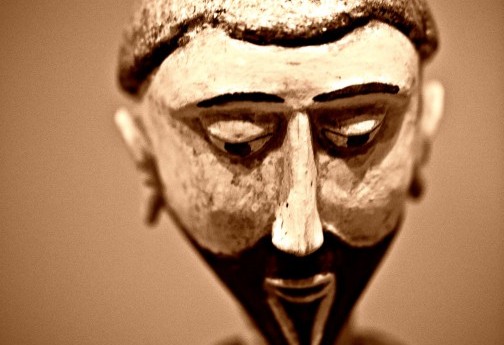Ex-Franciscan friar, Dr Alan McManus, reflects upon the extraordinary life of St. Francis of Assisi and reveals, not only a man with a remarkable heart for animals, but also a revolutionary figure against cruelty and injustice.
 Aquinas is famously not an advocate of animal welfare. This bad press, of both animals and Aquinas, is a great pity because in his Summa Theologica there is much that has the potential to be of help to our fellow creatures and to ourselves in our relations with them and with each other. In a clear online essay, Dr Judith A. Barad discusses and references this potential, focusing on Aquinas’ opposition to cruelty: if we are cruel to our fellow creatures then we may be similarly cruel to each other.
Aquinas is famously not an advocate of animal welfare. This bad press, of both animals and Aquinas, is a great pity because in his Summa Theologica there is much that has the potential to be of help to our fellow creatures and to ourselves in our relations with them and with each other. In a clear online essay, Dr Judith A. Barad discusses and references this potential, focusing on Aquinas’ opposition to cruelty: if we are cruel to our fellow creatures then we may be similarly cruel to each other.
Some years ago, while writing a Religious Studies essay on Krishna, Cows and Killing, I had the brainwave of collating MAFF documents (from the UK Ministry of Agriculture, Fisheries and Food on culling sheep, goats and cattle during the Foot and Mouth Disease epidemic) with documents from Nazi death camps. I found I didn’t have to. The chilling, impersonal and inhuman obsession with numbers and detail in collecting, corralling and killing victims then disposing of their bodies was the same.
Barad also brings out Aquinas’ hierarchy of vegetative, animate and human souls, deriving from his philosophical source, Aristotle, and elaborated in the Great Chain of Being – beautifully presented in a book of the same title by Arthur O. Lovejoy. This neo-Platonic elaboration (Aristotle being the most famous pupil of Plato) informs, or is informed by, the third great cultural influence on European thought, besides the Hebrew and the Greek: the Hermetic. Translated, or invented, by Marsillio Ficino for Cosimo de’ Medici in the 15th century, the Corpus Hermeticum purported to originate in ancient Egypt. Dame Frances Yates first brought academic rigour to this discipline, with her Giordano Bruno and the Hermetic Tradition, and what specifically interests me is the affirmation of creation as blessing shared by both Hebrew and Hermetic traditions. The great Hermetic hymn in the Asclepius describes creation as:
this whole incomparable work of God, glorious construction, all-good creation made up of an infinite diversity of forms, instrument of the will of God who, without envy, lavishes his favour upon his work, in which is assembled in one all, in a harmonious diversity, all that can be seen which is worthy of reverence, praise and love
 This is not an affirmation that is pervasive in the Church, unfortunately. Largely due to the continuing influence of his pre-conversion spirituality on Augustine of Hippo, a disdain for creation and for our fellow creatures entered into Christian thought. This kind of world-denying spirituality is certainly evident in Frances of Assisi and he is likely to have had a closer spiritual influence than Augustine, in the form of his father whose devotion to the gnostic Cathars of Languedoc led him to name his son ‘Francesco’: ‘Frenchman’.
This is not an affirmation that is pervasive in the Church, unfortunately. Largely due to the continuing influence of his pre-conversion spirituality on Augustine of Hippo, a disdain for creation and for our fellow creatures entered into Christian thought. This kind of world-denying spirituality is certainly evident in Frances of Assisi and he is likely to have had a closer spiritual influence than Augustine, in the form of his father whose devotion to the gnostic Cathars of Languedoc led him to name his son ‘Francesco’: ‘Frenchman’.
However Francis’ full heart breaks through the bonds of this constricting spirituality and values creatures as themselves praises of God. God is praised in and through the creatures, not only by humans marvelling and praising God for their beauty, but by the even non-human creatures themselves praising God by simply being in existence. Thus Francis does not accord animals the solely instrumental value to which Aquinas later confines them.
Francis tends to be considered the Hallmark card of hagiography, a nice wee statue beside the birdbath. However liberation theologians of Latin America such as Prof. Leonardo Boff take him as a revolutionary model, because of his solidarity and identification with the poor. Pope Francis has recently made his namesake’s Canticle of the Creatures more famous by the title (usually spelled incorrectly) of his encyclical Laudato Si’. Much has been made, and rightly so, of awareness of and action against the effects of industrial pollution on climate change. However the Canticle also contains these lines, which bring us back to the ponderings of Aquinas against cruelty:
Laudato si’, mi Signore, per quelli che perdonano per lo Tuo amore et sostengono infrmitate et tribulatione (Cantico delle Creature)
Be praised, my Lord, by those who pardon by Your love and sustain infirmities and tribulations (Canticle of the Creatures)
 The Italian may be interpreted to mean that God is praised both for and by those who find it in their hearts to pardon, that this pardoning is itself a blessing as the pardoners are themselves both blessed and blessing; and similarly in their sustaining, supporting, those who suffer infirmity and tribulation – words which are echoed in the many beautiful versions of the prayer of St Francis on injury and pardon.
The Italian may be interpreted to mean that God is praised both for and by those who find it in their hearts to pardon, that this pardoning is itself a blessing as the pardoners are themselves both blessed and blessing; and similarly in their sustaining, supporting, those who suffer infirmity and tribulation – words which are echoed in the many beautiful versions of the prayer of St Francis on injury and pardon.
When next you, busy as we are all busy, stressed as we moderns are all often stressed, find your hand hesitating over products on shelves in supermarkets, think of these words. When you are selecting cleaning products or cosmetics and you notice the leaping bunny logo on some, and not on others, think about injury and pardon. The authority of the Angelic Doctor and the humility of the poor saint of the poor agree: your soul will be in much better health and you will be a more beautiful person if you choose mercy rather than cruelty.
Dr Alan McManus, an ex-Franciscan friar, is the author of Alchemy at the Chalkface, Only Say The Word and Life Choice, all of which discuss the ethical implications of the work of the American philosopher Robert M. Pirsig.




